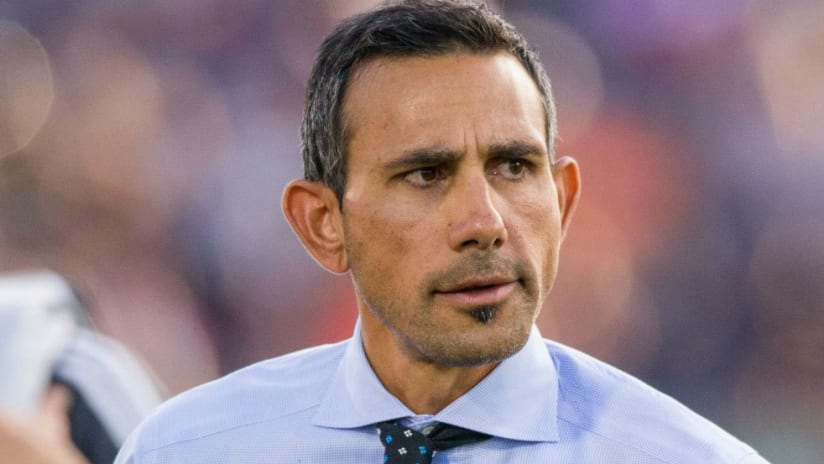COMMERCE CITY, Colo. – Finding a top head coach can be a rarity in professional sports. Loyalty, perhaps, is an even more rare find.
That’s not the case at Dick’s Sporting Goods Park.
The Colorado Rapids’ front office has deviated from the national trend of coaching musical chairs, giving head coach Pablo Mastroeni its trust entering his third season in 2016 with hopes that he can achieve the same levels coaching soccer that he did as a player.
“The bottom line for us is we knew this was going to take time,” Rapids team president Tim Hinchey said at the end of the 2015 season. “As a person I don’t believe in musical chairs. I don’t like how our industry is so quick to make different decisions. A lot of that to me is securing stability within a club… I just think we need to refocus and continue to focus hard on what we’re trying to accomplish as a group, and I think Pablo is the right guy to do it.”
Mastroeni echoed the importance of stability in his meeting with the media this week.
“There has to be a sense of trust,” he said. “Because of the turnover throughout the last six years here at the club, I think it doesn’t breed a lot of trust.
“In the offseason, I spent some time reflecting on a lot of different things,” Mastroeni continued. “One of them was the culture I wanted in the locker room. Knowing that we were going to have this much turnover, it was important to get in front of it when the players first came in. It was going to be a player led culture, a player owned culture and a coach-guided culture. In the previous two years, a combination of the players not taking enough responsibility and me not giving them enough responsibility.”
However, just because there’s trust doesn’t mean there’s a lack of urgency. One main goal has resonated among Rapids players, coaches and executives this preseason: making the MLS Cup Playoffs in 2016.
“[Playoffs] are always important,” said Hinchey. “Our expectation every single year is to be in the playoffs. Period.”
It’s the reason why the Rapids head coach didn’t take an offseason. Instead, Mastroeni racked up the frequent flyer miles while seeking out additional expertise.
His first stop was England, where he visited both North London Derby rivals by comparing the coaching styles of Tottenham’s Mauricio Pochettino and Arsenal’s Arsene Wenger.
“Mauricio and I spoke here at the All-Star Game, and Claudio Lopez was a teammate of his with Argentina,” Mastroeni said. “He invited me to spend the better part of five or six days watching training. The most important thing for me was the sharing of ideas. He opened my eyes to a lot of different ways of looking at it.”
At Arsenal, he met with assistant coach Steve Bould while bearing witness to the methods of Wenger.
“Steve Bould was another great soccer mind. He explained to me the roles and the way they operate,” Mastroeni said of that visit. “Arsene is much more of a philosopher. He’s a very open minded manager and allows those players to find creative ways to overcome their own difficulties.”
The styles of the structured Pochettino and philosophical Wenger contrasted greatly, but both have experienced levels of success in the English Premier League. Seeing this, Mastroeni was able to draw a conclusion regarding his own coaching style.
“You have to coach from your authentic self,” he said. “That’s a thing that you have to keep fine tuning and carving away at.”
It didn’t stop there. Upon his arrival back in the US, Mastroeni attended a supplementary coaching course in Orlando alongside MLS peers.
“I spent a lot of time with [Sporting Kansas City head coach] Peter Vermes and [Seattle Sounders head coach] Sigi Schmid, guys who are coaches,” he said. “The one-on-one conversations were super insightful and very eye opening to me in not thinking like a player, but thinking like a coach.”
For Mastroeni, just 39-years-old and two full seasons removed from his playing career, it’s that transition that has been the biggest challenge.
“In other words, playing soccer and coaching soccer have nothing to do with each other,” he elaborated. “I just understand the game. Coaching comes from a place of teaching, pedagogy. How do you communicate that? How do you take 18 years of experience and simplify it so that a kid coming out of college understands what you’re talking about. Understanding how to do this only comes with time. This is the biggest problem with soccer players who coach.”
But in spite of those real challenges, there’s still no room to blame mitigating circumstances, according to Mastroeni. He cited the roster support of the team’s technical staff, which has brought in the likes of Shkëlzen Gashi and Marco Pappa to bolster the attack in addition to young outside backs Mekeil Williams and Eric Miller this offseason.
“I think everyone upstairs has gone all in as well. As a coach, you’ll always have a million reasons to make excuses. It’s not about making excuses, it’s about putting your best foot forward from your experiences,” he said. “With the addition of guys like Pappa and Gashi and bringing back a good core group of players, the makeup of the team is completely different. I feel that we have players in that clubhouse that have played at a high level and possess the responsibility to lead that group.”
From player to coach to executive, responsibility will be the key word in 2016, a season that could prove to be sink or swim in Colorado.
“This is going to be an important year for our club, maybe the most important year for the club,” Mastroeni said. “The amount of money that we’re investing in these players, the type of players we’re bringing in, the style of play and the culture in the locker room, it’s a make-or-break year for us.”












